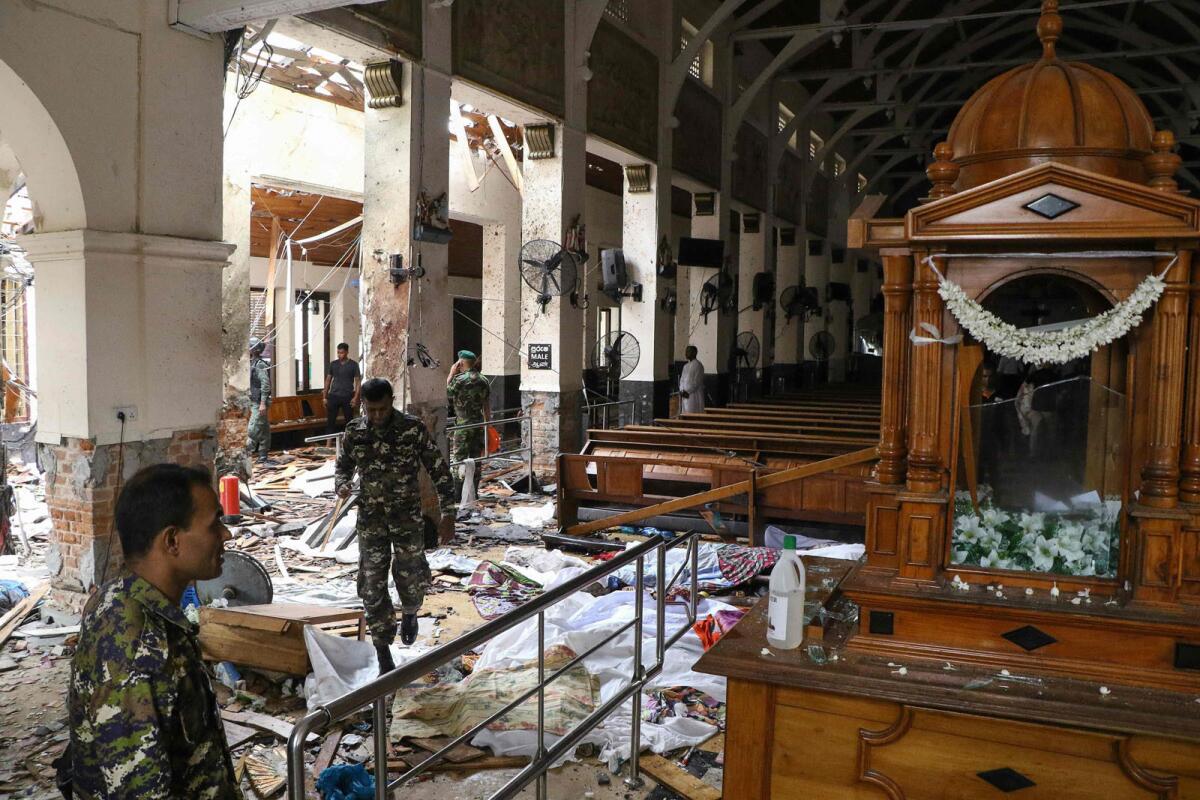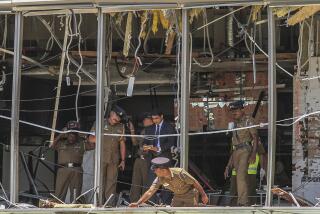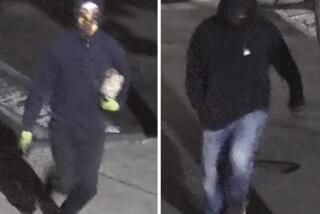Three Sri Lankan nationals charged in U.S. court with aiding 2019 bombings that killed hundreds

- Share via
Three Sri Lankan nationals were charged Friday in federal court in Los Angeles with supporting an ISIS cell that killed hundreds of people in a string of coordinated suicide bombings that shook Sri Lanka in 2019.
Mohamed Naufar, Mohamed Anwar Mohamed Riskan and Ahamed Milhan Hayathu Moahmed are accused of conspiring to provide material support to ISIS. Naufar and Milhan are also charged with aiding and abetting the receipt of military training from ISIS.
All three remain in custody in Sri Lanka, U.S. authorities said. It couldn’t be determined Friday if they had lawyers who could speak on their behalf.
Sri Lankan authorities arrested Naufar, Riskan and Milhan but have yet to file charges against them or anyone else implicated in the attacks, an FBI agent wrote in an affidavit. If the three were brought to the United States to stand trial, federal court in Los Angeles would be the proper venue, the agent wrote.
John C. Demers, an assistant attorney general who leads the Department of Justice’s National Security Division, said in a statement that U.S. authorities “fully support the Sri Lankan investigation and prosecution of these terrorists” and are working toward a “shared goal of holding these defendants accountable for their crimes.”
“At the same time,” Demers added, “these charges reflect that the U.S. justice system remains a powerful tool to bring to bear against those who harm our citizens abroad.”
FBI agents worked alongside Sri Lankan authorities to investigate the Easter Sunday attacks. An agent’s 72-page affidavit, unsealed Friday, offers considerable new insight into the investigation and ties it uncovered between the Sri Lankan terrorist cell and ISIS leadership in Syria.
The blasts began at 8:45 a.m. April 21, 2019. Eight men detonated explosives strapped to their backs in quick succession at churches and hotels in the cities of Colombo, Negombo and Batticaloa, killing 268 people and injuring 500, FBI Special Agent Merrilee R. Goodwin wrote in the affidavit. Five U.S. citizens were among the dead.
The bombers belonged to a group that called itself ISIS in Sri Lanka, Goodwin wrote. ISIS leadership in Syria claimed responsibility for the blasts, and published through its news agency an image and video of the Sri Lankan attackers swearing allegiance to the leader of ISIS, Abu Bakr al-Baghdadi, who has since been killed by U.S. forces.
The mastermind of the attacks and self-styled commander of the Sri Lankan ISIS cell, Goodwin wrote, was Mohamad Cassim Mohamad Zahran. Zahran, who blew himself up in a luxury hotel in the Easter morning attacks, claimed to have had a direct line of communication to ISIS leaders in Syria and used ISIS-issued instruction materials to train recruits in Sri Lanka, Goodwin wrote.
Naufar, the agent wrote, was the “second emir” of ISIS in Sri Lanka and Zahran’s second-in-command. Naufar led the cell’s propaganda efforts, recruited new members, and trained them to use weapons and embrace the ideology of ISIS, the affidavit said.
Over four days of interviews at Sri Lankan police headquarters in Colombo, Naufar explained to FBI agents how he met Zahran, warmed to the message of ISIS and eventually embraced its cause. He initially disapproved of ISIS, he said, because its leaders endorsed violence against other Muslims and urged the destruction of Saudi Arabia, home to many of Islam’s holiest sites. But two incidents changed his mind, he said.
When a gathering organized by Zahran was marred by violence with Sufi Muslims, Sri Lankan police arrested Zahran’s followers but not the Sufis, Naufar told the agents. Later that year, Buddhist extremists attacked Muslims in Sri Lanka. Naufar came to believe the Sri Lankan government had failed to protect Muslims and was biased against them, the affidavit said.
In late 2017 or early 2018, Zahran recorded a video of himself, Naufar and others standing in a Sri Lankan forest, holding firearms and swearing allegiance to ISIS and its leader, Baghdadi, the affidavit said. Zahran sent the video to a Sri Lankan national who had traveled to Syria to join ISIS, with the understanding the footage would be shown to Baghdadi. Zahran later told his followers that ISIS leadership had endorsed the Sri Lankan cell and recognized him as its emir, or leader, Naufar told the agents.
With his group formally recognized as an ISIS affiliate, Zahran was provided a “detailed training syllabus” for new members, the affidavit said. The group set its eyes toward expansion. Naufar told the agents he organized multi-day training courses where, in rented homes, groups of 15 to 25 recruits were taught to shoot AK-47-style rifles and fashion black powder explosives. They were also schooled in ISIS ideology and ended each meeting by swearing allegiance to ISIS, Naufar told the agents, according to the affidavit.
Sri Lankan authorities seized a computer hard drive belonging to one of the suicide bombers that contained nearly a terabyte of ISIS training materials and propaganda. In one batch of pamphlets titled “The Book of Jihad,” recruits were urged to learn “to improvise and repair weapons, prepare Molotov cocktails, grenades, mines, homemade destructive devices, how to blow up bridges, [and] tear up and put out of service railroads and railroad cars,” the affidavit quoted the pamphlet as reading.
An article published by an ISIS news agency urged followers to target churches; the story was accompanied by a photograph of a church with the caption, “A popular crusader gathering place waiting to be burned down.”
Naufar claimed to have cut ties with Zahran a month before the Easter morning attacks, the affidavit said. He and his supporters were hiding in a safe house in Wattala, a suburb of Colombo, when he learned of the blasts, he told the agents.
Naufar acknowledged overhearing a discussion of bombmaking but otherwise claimed to have no role in or warning of the blasts, the affidavit said. Had he known, he would have tried to stop it, Naufar told the agents, if only because he saw a large-scale assault as a “strategic mistake.” Naufar said he advocated one-off “lone wolf” attacks that would allow the group to “continue its jihad,” according to the affidavit.
Naufar offered several reasons Zahran orchestrated the Easter morning bombings, according to Goodwin. For one, it was revenge for U.S.-backed airstrikes a month earlier on ISIS fighters in Baghuz, Syria. ISIS had published a video after the airstrikes urging its followers to attack “polytheistic churches” or “other places packed with cross worshipers,” the affidavit said.
ISIS had also directed its followers to “attack China and Chinese interests,” Naufar told the agents, and the company that owns the Shangri-La Hotel in Colombo, where Zahran blew himself up, is headquartered in Hong Kong.
Naufar also reasoned that Zahran chose to kill himself in a suicide attack rather than be arrested by Sri Lankan authorities, who were investigating his role in ISIS training camps and the desecration of Buddhist statues, according to the affidavit.
Riskan, Naufar’s codefendant in the U.S. case, is a member of the Sri Lankan ISIS cell who arranged safe houses and purchased chemicals used to make explosives, the affidavit said. According to the document, Riskan told FBI agents that Zahran had asked him three days before the bombings to take part in a “revenge mission,” referencing two incidents: the attack on a mosque and Islamic center in Christchurch, New Zealand, in which a white supremacist shot 51 people to death; and a recent ISIS defeat on the battlefields of Syria.
Riskan claimed to have refused to take part in the attacks, but he admitted packing the bombs used in them with ball bearings, the affidavit said. He also acknowledged testing a bomb on a beach in Batticaloa, a city on Sri Lanka’s east coast.
Milhan, the third defendant in the U.S. case, murdered two Sri Lankan police officers in an attempt to acquire firearms for the Sri Lankan ISIS cell, U.S. authorities charge. After efforts to obtain guns on the black market failed, Zahran directed Milhan to attack a police station, steal its weapons and leave no officer alive, Milan told FBI agents.
Milhan said he and three other members of the Sri Lankan ISIS cell entered a police station at 2 a.m., where they found one officer sleeping and another sitting in a chair outside. Two of the terrorists stabbed the sleeping officer to death, while Milhan ordered the other officer to lie face-down on the ground, then shot him in the back of the head, the affidavit said.
A Sri Lankan police official told the FBI that two police officers manning a checkpoint were killed about 2 a.m. on Nov. 28, 2018. One was stabbed 41 times and the other was shot in the head and the back. The killers made off with the officers’ revolvers and 10 rounds of ammunition, according to the police official.
More to Read
Sign up for Essential California
The most important California stories and recommendations in your inbox every morning.
You may occasionally receive promotional content from the Los Angeles Times.













